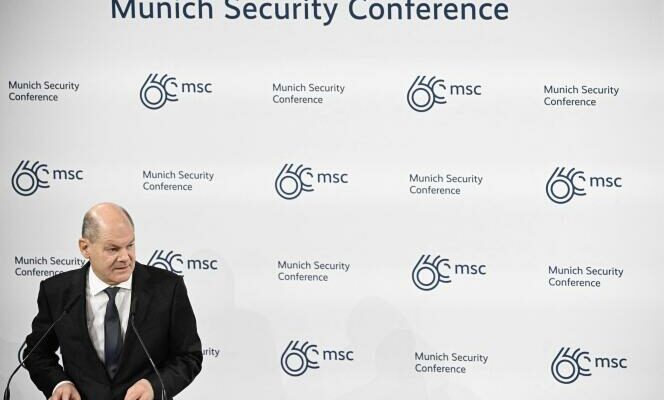Is it the tragic death of Alexei Navalny? The withdrawal of Ukrainian forces from the small town of Avdiïvka in the face of the Russian invader, on the eve of the second anniversary of the invasion? Ukrainian leaders’ calls for help over ammunition shortage? Or the backlash from the doubts sown by Donald Trump about the solidity of the Atlantic Alliance? Perhaps it is all of this at the same time: a strong sense of urgency about the need to defend Europe took hold of the participants in the 60e Munich Security Conference, which takes place from Friday February 16 to Sunday February 18.
On Saturday morning, Ukrainian President Volodymyr Zelensky clearly sounded the alarm, saying he was convinced that “Putin can lose” but on condition that the Westerners accelerate and intensify their deliveries of military equipment. “Keeping Ukraine in an artificial arms deficit, particularly munitions and long-range strike systems, allows Putin to adapt to the current intensity of the war”declared Mr. Zelensky, before addressing his audience with a phrase which earned him loud applause: “Don’t ask Ukraine when the war will end. But ask yourself why Putin is still able to pursue her. »
The day before, increased seriousness was already perceptible in Berlin and Paris, where the Ukrainian president had traveled to sign bilateral security agreements with Germany and France. Obviously, in these two European capitals, it is no longer just a question of helping Ukraine, but also of better protecting Europe: a discourse that has been going on for two years among Ukraine’s European neighbors – Poland and the Baltic States in the lead – but to which West European leaders have until now been much less sensitive.
“The Russian threat is real”
In Paris, Friday evening, Emmanuel Macron had much harsher words than previously on the state of the Russian threat: “Two years ago, the Kremlin regime attacked Ukraine, a European country. It has intensified and hardened its attacks against our country in terms of disinformation and on the cyber level. (…) Vladimir Putin’s Russia has become a methodical actor in the destabilization of the world »worried the French president, for whom “there is clearly a need for a European start, and more broadly from our allies, our partners and the international community.”
Saturday morning, in Munich, Olaf Scholz, who devoted his entire speech to the war in Ukraine, sent the same message. “The Russian threat is real. This is why our deterrence and defense capacity must be credible and remain so.declared the German Chancellor. Putin and his generals in Moscow must understand that we, the most powerful military alliance in the world, can defend every square meter of our territory; we must therefore strengthen the European pillar of NATO, including in terms of deterrence. »
You have 65% of this article left to read. The rest is reserved for subscribers.
